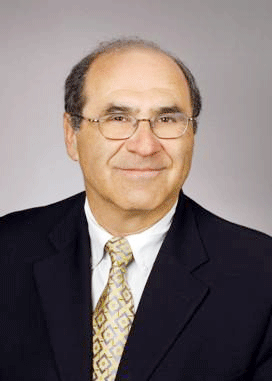Surface Enhanced Raman Spectroscopy (SERS)------Based Opportunities for Bio-sensors
SEMINAR
The State Key Lab of High Performance Ceramics & Superfine Microstructure
Shanghai Institute of Ceramics, Chinese Academy of Sciences
中国科学院上海硅酸盐研究所高性能陶瓷和超微结构国家重点实验室
Surface Enhanced Raman Spectroscopy
(SERS)
------Based Opportunities for Bio-sensors
Speaker
Prof. Martin Moskovits
Chemistry & Biochemistry Department
University of California, Santa Barbara
时间:11月6日(星期四)上午10:00
地点:四号楼8楼会议室
联系人:陈立东 研究员
陈喜红 副研究员
Martin Moskovits Brief Biography

Martin Moskovits, was Bruce and Susan Worster Dean of Science until 2007 and is currently Professor of Physical Chemistry at UC Santa Barbara. He was educated at the University of Toronto (BSc Physics and Chemistry, 1965, Ph.D. Chemical Physics, 1971). After receiving his BSc he co-founded OHM Distributors and Manufacturers Ltd. an electronics manufacturing company which was sold in 1968. He worked at Alcan Research and Development (later re-named Alcan International) in Kingston during 1970-71 and returned to the University of Toronto attaining the rank of Professor of Chemistry in 1982. From 1993-1999 he was Chair of the Department of Chemistry. He is a Fellow of the Canadian Institute for Advanced Research and was founding Director of its Nanoelectronics Program.
Professor Moskovits has authored or co-authored ca 250 technical papers, edited or co-edited 4 books and holds 15 patents. Over 80 graduate students and postdocs completed their studies under his supervision. These individuals are currently employed in industry, government and academia. Additionally, he hosted several international scientists as sabbatical guest in his laboratory.
Professor Moskovits' research interests have included matrix isolation, surface science, surface spectroscopy, surface-enhanced Raman, metal and semiconductor clusters, template-fabricated nanowires and nanotubes. He is best known for his work in surface-enhanced Raman spectroscopy and optical effect of nanostructures to which he provided the correct interpretation, leading to a number of predictions, later confirmed, and for development of porous anodic alumina as a powerful template for nanofabrication, one of the earliest developments in Nanotechnology. His current interests include nanosensors, nanoscience and technology.
Professor Moskovits is a Fellow of the American Association for the Advancement of Science, Fellow of the Royal Society of Canada, winner of the 1993 Gerhard Herzberg Award of the Spectroscopy Society of Canada, the 1993 Royal Society of Chemistry (London) award in Surface and Colloid Science, Killam Fellow (1989-91), Guggenheim Fellow, Department of Chemistry, UC, Berkeley, 1986-87, the 1995 400th Anniversary Johannes Marcus Marci Medal of the Czech Spectroscopy Society, 1999 winner of the CSC EWR Steacie Award, Fellow of Massey College, member of the editorial board of the Journal of Chemical Physics, 2000 Walter Chute Memorial Lecturer, Dalhousie University; inaugural Annual WINS lecturer, University of Western Ontario; member of the Advisory Board of NRC's Steacie Institute for Molecular Sciences and the National Institute for Nanotechnology, Edmonton, member of the Santa Barbara Technology Group board of advisors, former member of the Board of Sansum Diabetes Research Institute, and vice Chair of the US Department of Energy Basic Energy Sciences Advisory Committee.


 当前位置:
当前位置:

